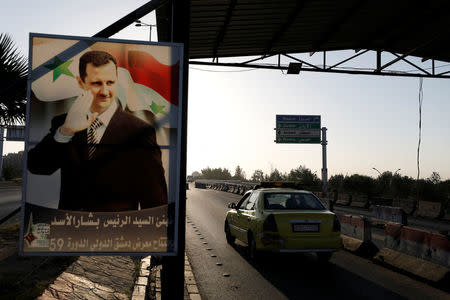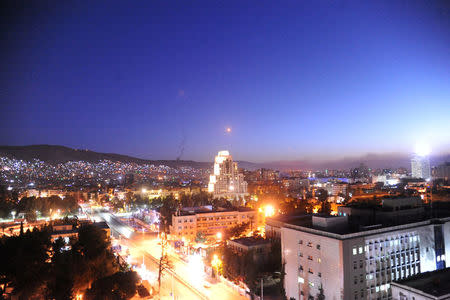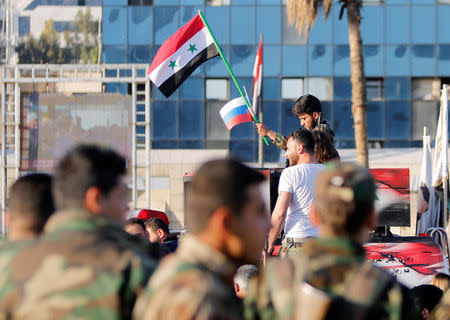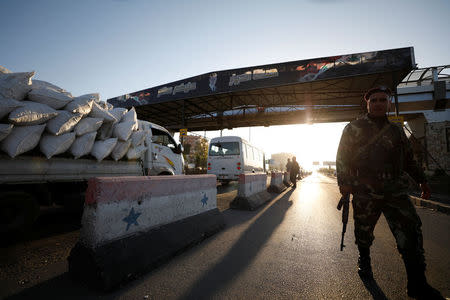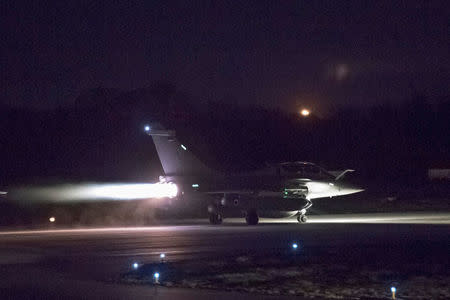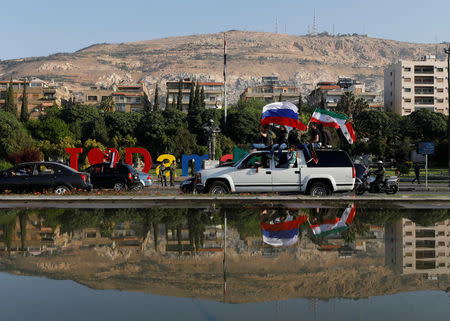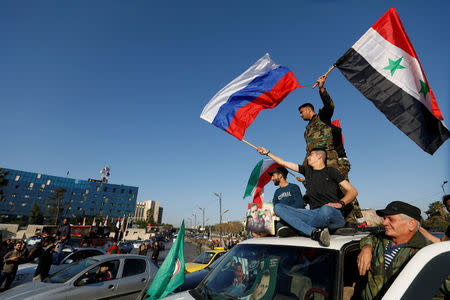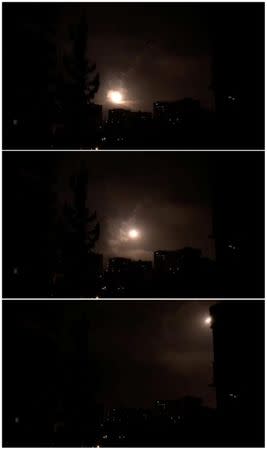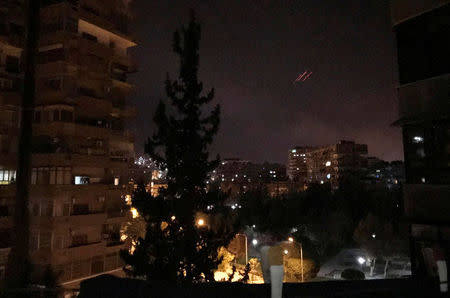U.S. says air strikes cripple Syria chemical weapons program
By Phil Stewart and Tom Perry
WASHINGTON/BEIRUT (Reuters) - Western powers said on Saturday their missile attacks struck at the heart of Syria's chemical weapons program, but the restrained assault appeared unlikely to shift the course of the 7-year-old civil war.
The United States, France and Britain launched 105 missiles overnight in retaliation for a suspected poison gas attack in Syria a week ago, targeting what the Pentagon said were three chemical weapons facilities including a research and development in Damascus' Barzeh district and two installations near Homs.
The bombing was the biggest intervention by Western countries against Syrian President Bashar al-Assad and his superpower ally Russia, but the three countries said the strikes were limited to Syria's chemical weapons capabilities and not aimed at toppling Assad or intervening in the civil war.
The air attack, denounced by Damascus and its allies as an illegal act of aggression, was unlikely to alter the course of a multi-sided war that has killed at least half a million people.
"We believe that by hitting Barzeh in particular we've attacked the heart of the Syrian chemicals weapon program," Lieutenant General Kenneth McKenzie said at the Pentagon.
U.S. President Donald Trump called the operation a success on Twitter and proclaimed: "Mission accomplished."
However, McKenzie acknowledged elements of Syria's chemical weapons program remain and he could not guarantee that Syria would be unable to conduct a chemical attack in the future.
In New York, U.S. ambassador to the United Nations, Nikki Haley, said at an emergency meeting of the U.N. Security Council that Trump told her that if Syria uses poisonous gas again, "the United States is locked and loaded."
At the United Nations, Russia said the U.S.-led strikes would complicate U.N. efforts to broker a political solution to the conflict in Syria.
Russian Foreign Minister Sergei Lavrov said earlier on Saturday that the strikes were "unacceptable and lawless."
Syria released video of the wreckage of a bombed-out research lab, but also of Assad arriving at work as usual, with the caption "Morning of resilience".
Ten hours after the missiles hit, smoke was still rising from the remains of five destroyed buildings of the Syrian Scientific Research Center in Barzeh, where a Syrian employee said medical components were developed.
There were no immediate reports of casualties.
Russia had promised to respond to any attack on its ally, but the Pentagon said no Russian air defense systems were used. Syria fired 40 unguided surface to air missiles - but only after the Western strikes had ended, the Pentagon said.
"We are confident that all of our missiles reached their targets," McKenzie said.
The Western countries said the strikes were aimed at preventing more Syrian chemical weapons attacks after a suspected poison gas attack in Douma on April 7 killed up to 75 people. They concluded Assad's government was to blame for gassing the Damascus suburb.
British Prime Minister Theresa May described the strike as "limited and targeted", with no intention of toppling Assad or intervening more widely in the war.
U.S. Defence Secretary Jim Mattis called the strikes a "one-time shot."
THREE TARGETS
Washington described its targets as a centre near Damascus for the research, development, production and testing of chemical and biological weapons, a chemical weapons storage site near the city of Homs, and another site near Homs that stored chemical weapons equipment and housed a command post.
The Pentagon said there had been chemical weapons agents at one of the targets, and that the strikes had significantly crippled Syria's ability to produce such weapons.
U.N. Secretary General Antonio Guterres urged all Security Council members to exercise restraint and avoid escalation in Syria, but said allegations of chemical weapons use demand an investigation.
Syrian state media called the attack a "flagrant violation of international law". Iran's Supreme Leader Ayatollah Ali Khamenei called it a crime and the Western leaders criminals.
Inspectors from the global chemical weapons watchdog OPCW were due to try to visit Douma later on Saturday to inspect the site of the suspected gas attack. Moscow condemned the Western states for refusing to wait for their findings.
Russia, whose relations with the West have deteriorated to levels of Cold War-era hostility, has denied any gas attack took place in Douma and even accused Britain of staging it to whip up anti-Russian hysteria.
However, Syria and its allies also made clear that they considered the attack a one-off, unlikely to do meaningful harm to Assad.
A senior official in a regional alliance that backs Damascus told Reuters the sites that were targeted had been evacuated days ago thanks to a warning from Russia.
The Western countries were at pains to avoid further escalation, including any unexpected conflict with their superpower rival Russia. French Defence Minister Florence Parly said the Russians "were warned beforehand", to avert conflict.
Dmitry Belik, a Russian member of parliament who was in Damascus and witnessed the strikes, told Reuters: "The attack was more of a psychological nature rather than practical. Luckily there are no substantial losses or damages."
The Western intervention has virtually no chance of altering the military balance of power at a time when Assad is in his strongest position since the war's early months.
ASSAD STRONG
In Douma, site of the suspected gas attack, the last buses were due on Saturday to transport out rebels and their families who agreed to surrender the town, state TV reported. That effectively ends all resistance in the suburbs of Damascus known as eastern Ghouta, marking one of the biggest victories for Assad's government of the entire war.
Russian and Iranian military help over the past three years has let Assad crush the rebel threat to topple him.
The United States, Britain and France have all participated in the Syrian conflict for years, arming rebels, bombing Islamic State fighters and deploying troops on the ground to fight that group. But they have refrained from targeting Assad's government, apart from a volley of U.S. missiles last year.
Although the Western countries have all said for seven years that Assad must leave power, they held back in the past from striking his government, lacking a wider strategy to defeat him.
The combined U.S., British and French assault involved more missiles, but appears to have struck more limited targets, than a similar strike Trump ordered a year ago in retaliation for an earlier suspected chemical weapons attack. That strike had effectively no impact on the war.
Mattis said the United States had conclusive evidence that chlorine gas had been used in the April 7 attack. Evidence that the nerve agent sarin was also used was inconclusive, he said.
Syria agreed in 2013 to give up its chemical weapons after a nerve gas attack killed hundreds of people in Douma. Damascus is still permitted to have chlorine for civilian use, although its use as a weapon is banned. Allegations of Assad's chlorine use have been frequent during the war although, unlike nerve agents, chlorine did not produce mass casualties as seen last week.
(Reporting by Phil Stewart and Tom Perry,; Additional reporting by Steve Holland, Idrees Ali, Yara Bayoumy, Joel Schectman in Washington; Samia Nakhoul, Tom Perry, Laila Bassam, Ellen Francis and Angus McDowall in Beirut; Kinda Makieh in Barzeh; Michael Holden and Guy Faulconbridge in London; and Jean-Baptiste Vey, Geert de Clerq and Matthias Blamont in Paris; Polina Ivanova in Moscow, Michelle Nichols in New York; Writing by Peter Graff, Kevin Liffey and Doina Chiacu; Editing by Yara Bayoumy, Diane Craft and Daniel Wallis)

